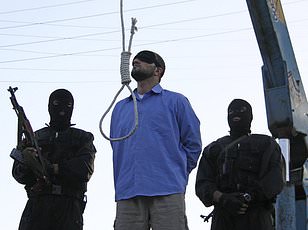Global use of the death penalty rises to the highest level since 2015 as Iran goes on a killing spree and China continues to execute prisoners 'in their thousands', Amnesty says
- Use of death penalty continues to surge in hotspots despite falling use globally
The number of state-ordered executions recorded worldwide last year jumped to the highest level since 2015, with spikes in Iran and across the Middle East, Amnesty International said in a new report.
As many as 1,153 executions were recorded globally in 2023, up 30 per cent from 2022, despite a trend towards countries abandoning the death penalty in practice.
Amnesty said the figure does not include thousands of death sentences believed to have been carried out in China, where data is not available due to state secrecy.
The human rights group said the spike in recorded executions was primarily driven by Iran, where authorities in the hard-line Islamic nation executed at least 853 people last year, compared with 576 in 2022.
Amnesty has closely followed the terrifying crackdown on human rights nationwide, with dissenters increasingly put to death under ill-defined charges of 'corruption on earth', the rights groups said.
Executions in Yemen, in the throes of a devastating civil war, increased nearly fourfold in the same period, as executions in Saudi Arabia decreased marginally from the historic highs recorded in recent years.


A blindfolded man convicted of armed robbery, kidnapping and slaying of two policemen waits to be hanged in public in Tehran, Iran, on April 16, 2011
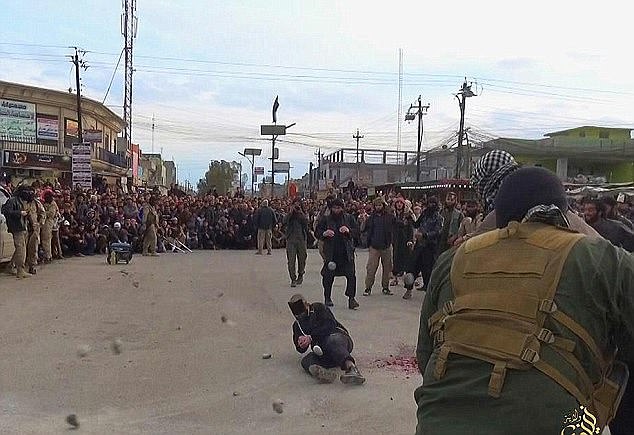
Horrific footage showed ISIS militants throwing large stones at the couple to kill them
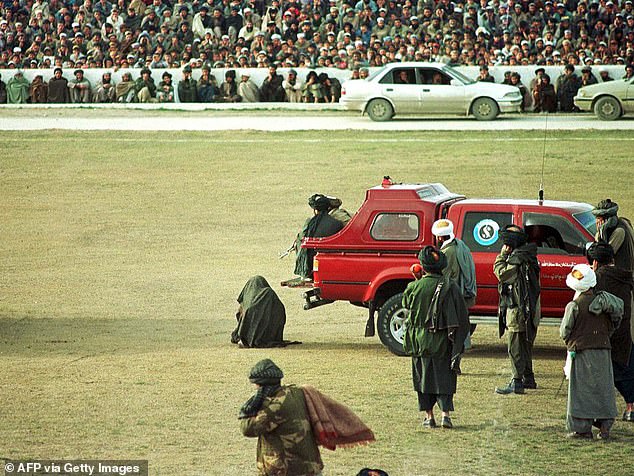
Illustrative image shows an alleged murderer being executed before a crowd in Kabul in 1998

Iranian officials prepare the noose for a public execution in 2014
In Iran, where criminals may still be publicly hanged for their offences, yearly recorded executions continued to climb in 2023, per Amnesty's tally.
State-sanctioned executions have continued to climb in recent years, 2022 seeing a staggering 83 per cent increase on 2021's figures.
Iran alone accounted for 74 per cent of the global total, followed by Saudia Arabia.
This comes amid a period of unrest within Iran driven in part by resentment over the Islamic Republic's repression of the civilian population, surging since the death of Iranian woman Mahsa Amini in police custody in September 2022.
'The Iranian authorities showed complete disregard for human life and ramped up executions for drug-related offences, further highlighting the discriminatory impact of the death penalty on Iran's most marginalised and impoverished communities,' Agnes Callamard, Amnesty's secretary general, said in a statement.
Those executed included 24 women and five people who were children at the time the crimes were committed, Amnesty said, adding that the practice disproportionately affected Iran's Baluch minority.
While most were hanged for drug-related offences, 38 were put to death for 'corruption on earth' - a vaguely-worded charge that has been repeatedly used to convict dissenters since the start of nationwide protests over the mandatory headscarf rule in October 2022.
Iran executed eight men in cases related to those protests but rights groups argue that the surge in hangings on all charges is aimed at instilling fear in the wider population.
Iran still uses cranes to hang its prisoners, tying them to a noose and then lifting them high in the air to be seen for miles. In 2022, protestor Majidreza Rahnavard made headlines when he was charged with 'waging war against God', ran through a 'sham trial' and put to death.
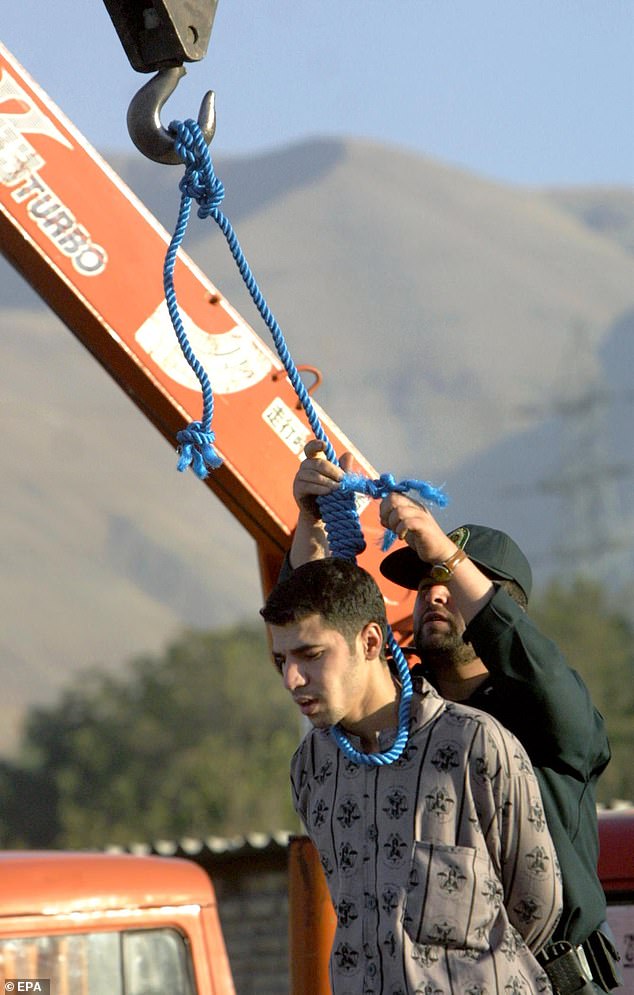
An Iranian policeman ties the noose around the neck of Majid Ghasemi before being publicly hanged in east Tehran 29 September 2002

The mother (R) of Abdolah Hosseinzadeh, who was murdered in 2007, slaps Balal who killed her son during the execution ceremony in the northern city of Noor, Iran on April 15, 2014

Journalist Hassan Hanafi, convicted of murdering colleagues for the Al-Qaeda-linked Shebab jihadist group, is tied to a wooden post before being executed in Mogadishu on April 11, 2016
Executions conducted in public with a crane have been more rare in recent years, though Iran used the same manner of hanging to put down unrest following the disputed 2009 presidential election and the Green Movement protests that followed.
Typically, those condemned are alive as the crane lifts them off their feet, hanging by a rope and struggling to breathe before they asphyxiate or their neck breaks.
Amnesty said China, Iran, Saudi Arabia, Somalia and the United States were the five countries with the highest number of executions in 2023, though data on executions in China remains difficult to attain.
In 2022, the World Coalition Against the Death Penalty said that at least 8,000 people per year were executed in China from 2007.
While some cases have been made public, China keeps data on its use of the death penalty secret.
China's alleged use of 'execution vans' have shocked European onlookers with their apparent parallels to the use of mobile gas vans in Nazi Germany.
The vans in China allow roaming death squads to carry out state-sanctioned killings without the need to move the prisoner to an execution ground.
Saudi Arabia showed a notable decline in the number of state-orchestrated executions last year.
The Middle Eastern kingdom saw 172 executions in 2023, down 12 per cent from 2022's figures.
Still, executions in Saudi Arabia accounted for 15 per cent of the global total, despite representing around 0.45 per cent of the global population.
Saudi Arabia is notorious for its beheadings, with the kingdom executing 81 people in a single day in 2022.
Executions tripled that year to 196 and they remained at a high level in 2023, with 172 people put to death, mostly for murder or terror offenses, including six women.
The executions, together with the killing of Saudi dissident Jamal Khashoggi at the Saudi consulate in Istanbul in October 2018, have undermined the image of a more open, tolerant society promoted by reform-minded Crown Prince Mohammed bin Salman.
Ms Callamard also claimed that progress had faltered in the US, where executions rose from 18 to 24 and a number of states 'demonstrated a chilling commitment to the death penalty and a callous intent to invest resources in the taking of human life'.
The report cited the introduction of bills to carry out executions by firing squad in Idaho and Tennessee, and Alabama's use of nitrogen gas as a new, untested execution method in January.
It took Kenneth Euguene Smith 22 minutes to die under the effects of nitrogen hypoxia, after officials assured the public the method would ensure a quick and painless death.
Smith writhed around in pain for nearly ten minutes before his breathing appeared to stop, drawing criticism from rights groups worldwide.

An Iranian judiciary official flogs serial killer Mohammad Bijeh before his execution in March 2005

Between 2015 and 2022, there was an average of 129.5 executions per year in Saudi Arabia

Saudi Arabia still beheads criminals for various reasons. In some cases a victim will be beheaded and then crucified, the body displayed publicly


Smith had been serving a jury-decided life sentence for the paid assassination of Elizabeth Sennett in Alabama in 1988
The only country in sub-Saharan Africa to use the death penalty in 2023 was Somalia, where executions tripled to 38.
Courts in the fragile Horn of Africa nation, which has faced a 17-year insurgency at the hands of the Al-Qaeda-linked Al-Shabaab group and is also battling militants from the Islamic State group, regularly hand down the death sentence for terrorism offences.
Around three-quarters of African countries have either abolished the death penalty in law or in practice.
Last year, executions by shooting were recorded in Afghanistan, China, North Korea, Palestine, Somalia and Yemen.
Lethal injection was used in China, the USA and Vietnam.
Hanging was used in Bangaldesh, Egypt, Iran, Iraq, Kuwait, Singapore and Syria.
Beheading was still common in Saudi Arabia.
As many as 8 per cent of the UN's 193 members were known to have executed people, according to Amnesty.
The total number of executions was the highest total on record since 2018, when 2,531 new death sentences were known to have been carried out.
The organisation also noted that the death penalty continued to be used 'in ways that violated international law' in a number of countries in 2023.
At least eight public executions were carried out in Afghanistan and Iran.
At least five people in Iran were executed for crimes committed before they turned 18.
In the USA, Maldives and Japan, people with mental or intellectual disabilities remained under sentence of death.
And death sentences were 'known' to have been imposed following proceedings that failed to meet fair trial standards in countries including Afghanistan, China, Iran, Iraq, North Korea, Pakistan, Saudi Arabia and Yemen.

FILE: This combination image made up of screengrabs from a video smuggled out of Iran purports to show the scene of a public stoning
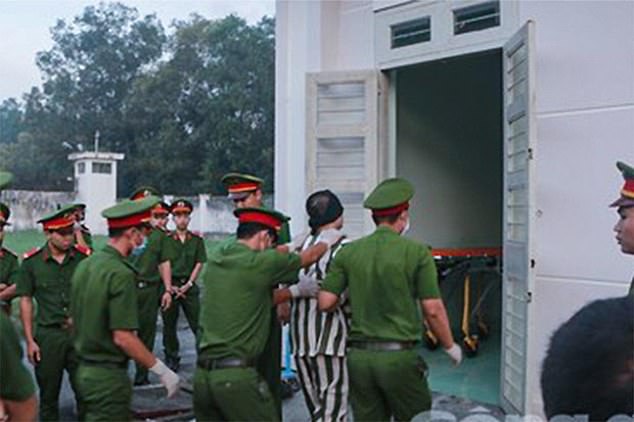
Police escort a death row prisoner to an execution room in Ho Chi Minh City, Vietnam

A death row inmate is seen eating their last meal and smoking their final cigarette in Vietnam
The group also suggested 'confessions' to crimes under conditions of torture or ill-treatment were used to convict people in Egypt, Iran and Saudi Arabia.
Amnesty said that despite the setbacks, there was progress globally because the number of countries that carried out executions dropped to 16, the lowest on record since the group began monitoring.
Nearly three-quarters of all countries had abolished capital punishment in law or in practice by the end of 2023.
A total of 112 have abolished it for all crimes, nine others have abolished it for ordinary crimes and a further 23 are considered de-facto abolitionists because they have not executed anyone in a decade.
The only country on the European continent to still apply the death penalty is the former Soviet republic of Belarus, a staunch ally of Russia.


























